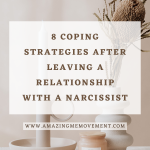Getting into a relationship with a narcissist can cause deep emotional hurt that needs a lot of time, patience, and self-care to fix. Dealing with the aftermath of this difficult situation can be very tough, pushing your emotional strength to its limits. Despite the pain and chaos, it is possible to come out of this tough experience feeling stronger, wiser, and more resilient than before.

This blog wants to look into and give helpful advice on ways to help people heal after being in a relationship with a narcissist. By trying out these tips and strategies, individuals can start a journey towards understanding themselves better, growing, and eventually feeling emotionally better. Additionally, you may look into the long-term effects of having relations with a narcissist and books to heal from narcissistic abuse.
8 Ways To Move On From A Relationship With A Narcissist
Acknowledge what happened

Acknowledging the truth about the relationship can be a profound journey that includes accepting past traumas and understanding their effects on your emotional state. This process of self-awareness and embracing reality is instrumental in breaking away from the harmful patterns of manipulation and emotional abuse.
Confronting these difficult experiences directly empowers you to steer your healing path and progress toward a future characterized by self-compassion, resilience, and personal development. By facing these challenges with courage and openness, you pave the way for profound growth and a renewed sense of well-being.
Reach out to your support system

It is important to have a reliable support network comprising friends, family, or a therapist who can offer you validation, empathy, and guidance as you work through your healing process. Having people around you who understand and care for your well-being can provide comfort, reassurance, and valuable insights to help you navigate the challenges of healing after a relationship with a narcissist.
So, their support can offer you a safe space to express your feelings, receive encouragement, and gain perspective on your journey toward recovery and emotional well-being.
Set boundaries and stick with them

Setting clear boundaries with the narcissist is essential to safeguarding your emotional well-being. By establishing and maintaining boundaries, such as limiting contact and communicating your needs, you create a protective barrier that helps prevent further emotional harm.
Consequently, prioritizing your mental health by setting these boundaries allows you to create a safe space for yourself, where you can focus on healing and rebuilding your emotional resilience. It enables you to assert your needs, maintain your emotional stability, and establish a sense of control over your interactions with the narcissist, ultimately supporting your overall well-being and recovery process.
Prioritize self-care

Making self-care a priority involves engaging in activities that cater to your mental, physical, and spiritual well-being. It is crucial to focus on practices that bring you happiness and fulfillment, such as mindfulness exercises, regular physical activity, and activities that promote relaxation and inner peace.
By dedicating time to self-care, you nurture your overall health and vitality, ensuring that you are tending to both your emotional and physical needs. This can include activities that reduce stress, boost your mood, and provide a sense of balance and rejuvenation, ultimately supporting your journey towards healing and self-discovery after a relationship with a narcissist.
Resolving Relationship Troubles: What Does It Mean To Be Clingy?
Focus on healing

Engaging in therapy or joining support groups can be instrumental in addressing and healing the emotional wounds inflicted by a past relationship with a narcissist. These therapeutic avenues provide a safe space to navigate complex emotions, process trauma, and gain valuable insights into your experiences.
Moreover, it is crucial to understand that healing is a gradual process that requires patience, self-compassion, and a willingness to confront difficult emotions. By giving yourself the time and space to work through your feelings at your own pace, you empower yourself to gradually unravel the layers of pain and move towards a place of emotional renewal and inner peace.
Build your self-esteem

Engaging in activities that enhance your self-esteem and self-worth is a vital aspect of healing after a relationship with a narcissist. By investing in pursuits that uplift and validate your worth, you can nurture a positive self-image and rebuild confidence. Recognizing and celebrating your strengths can bolster your sense of self-worth while setting realistic goals provides a sense of accomplishment and progress.
Practicing self-compassion is essential as you navigate this journey, allowing yourself grace and understanding as you rebuild your confidence and cultivate a healthier relationship with yourself. By prioritizing activities that promote self-esteem and self-worth, you are taking proactive steps toward reclaiming your sense of value and empowerment.
Instill mindfulness

Remaining in the present moment and fostering self-awareness through mindfulness techniques can be transformative in the healing process following a relationship with a narcissist. Mindfulness enables you to observe your thoughts and emotions without judgment, allowing for a deeper connection to your inner self.
Furthermore, mindfulness practices encourage introspection and self-reflection, facilitating a profound understanding of your emotions, triggers, and behavioral patterns. This increased self-awareness can pave the way for personal growth, emotional resilience, and a more profound connection with yourself.
Try out new activities

Venturing into new hobbies, interests, or social activities that resonate with you can be a powerful tool in your healing journey post a relationship with a narcissist. By immersing yourself in activities that bring joy and fulfillment, you open up pathways to rediscover aspects of yourself that may have been overshadowed during the toxic relationship.
Investing in fresh experiences provides an opportunity to explore your passions, strengths, and talents, fostering a sense of personal growth and reconnection with your authentic self. Engaging in these activities not only aids in rediscovering your identity but also helps in cultivating a newfound sense of purpose and fulfillment that extends beyond the confines of the past relationship, empowering you to shape a future centered around your well-being and happiness.
End Of A Relationship Signs: When To Let Go And Move On
What To Do After Leaving A Relationship With A Narcissist
Navigating life after ending a relationship with a narcissist is a challenging yet transformative process that demands self-care, self-compassion, and a solid support system. By placing emphasis on your emotional and physical well-being, establishing boundaries, and concentrating on your path to healing, you can emerge from this experience not only stronger but also wiser and more resilient.
Although it’s understandably difficult to move on from being in a relationship with a narcissist, I hope these topics can help you on your journey:
- How To Spot a Narcissist-5 Warnings Signs Not To Ignore
- 10 Covert Passive Aggressive Narcissist Traits To Watch For
- How to Leave a Narcissist:8 Things You Need To Do
- 30 Brutal Narcissistic Abuse Quotes That Will Hit You in the Feels











Leave a Reply